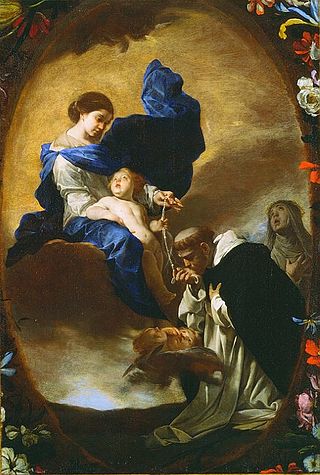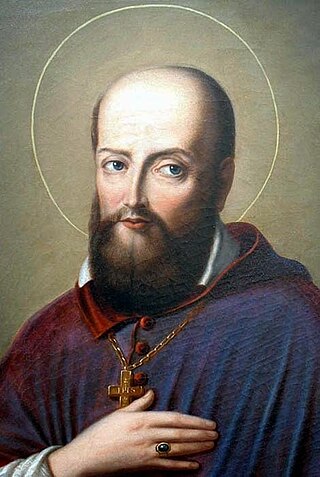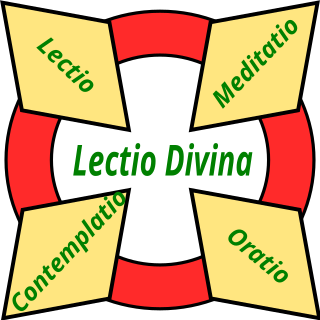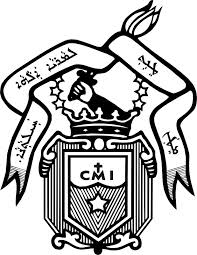
Caterina di Jacopo di Benincasa, TOSD, known as Catherine of Siena, was an Italian Catholic mystic and pious laywoman who engaged in papal and Italian politics through extensive letter-writing and advocacy. Canonized in 1461, she is revered as a saint and as a Doctor of the Church due to her extensive theological authorship. She is also considered to have influenced Italian literature.

Teresa of Ávila, OCD, also called Saint Teresa of Jesus, was a Carmelite nun and prominent Spanish mystic and religious reformer.

The Rosary, formally known as the Psalter of Jesus and Mary, also known as the Dominican Rosary, refers to a set of prayers used primarily in the Catholic Church, and to the physical string of knots or beads used to count the component prayers. When referring to the prayer, the word is usually capitalized ; when referring to the prayer beads as an object, it is written with a lower-case initial letter.

Confession, in many religions, is the acknowledgment of sinful thoughts and actions. This may occur directly to a deity or to fellow people.

The Congregation of Holy Cross, abbreviated CSC, is a Catholic clerical religious congregation of pontifical right for men founded in 1837 by Basil Moreau, in Le Mans, France.

Francis de Sales, C.O., O.M. was a Savoyard Catholic prelate who served as Bishop of Geneva and is a saint of the Catholic Church. He became noted for his deep faith and his gentle approach to the religious divisions in his land resulting from the Protestant Reformation. He is known also for his writings on the topic of spiritual direction and spiritual formation, particularly the Introduction to the Devout Life and the Treatise on the Love of God.

Christian meditation is a form of prayer in which a structured attempt is made to become aware of and reflect upon the revelations of God. The word meditation comes from the Latin word meditārī, which has a range of meanings including to reflect on, to study, and to practice. Christian meditation is the process of deliberately focusing on specific thoughts and reflecting on their meaning in the context of the love of God.

In Western Christianity, Lectio Divina is a traditional monastic practice of scriptural reading, meditation and prayer intended to promote communion with God and to increase the knowledge of God's word. In the view of one commentator, it does not treat Scripture as texts to be studied, but as the living word.

The Carmelites of Mary Immaculate abbreviated CMI, formerly also known as the Servants of Mary Immaculate, is a Catholic clerical religious congregation of pontifical right for men of the Syro-Malabar Catholic Church, and is the largest such congregation in the Syro-Malabar Church.
The Sisters of the Holy Cross are one of three Catholic congregations of religious sisters which trace their origins to the foundation of the Congregation of Holy Cross by Basil Moreau in Le Mans, France in 1837. Members designate themselves with the post-nominals CSC.
The Order of the Holy Cross is an international Anglican monastic order that follows the Rule of St. Benedict.
Catholic spirituality includes the various ways in which Catholics live out their Baptismal promise through prayer and action. The primary prayer of all Catholics is the Eucharistic liturgy in which they celebrate and share their faith together, in accord with Jesus' instruction: "Do this in memory of me." The Catholic bishops at the Second Vatican Council decreed that "devotions should be so drawn up that they harmonize with the liturgical seasons, accord with the sacred liturgy, are in some fashion derived from it, and lead the people to it, since, in fact, the liturgy by its very nature far surpasses any of them." In accord with this, many additional forms of prayer have developed over the centuries as means of animating one's personal Christian life, at times in gatherings with others. Each of the religious orders and congregations of the Catholic church, as well as lay groupings, has specifics to its own spirituality – its way of approaching God in prayer to foster its way of living out the Gospel.

Catholic devotions are particular customs, rituals, and practices of worship of God or honour of the saints which are in addition to the liturgy of the Catholic Church. The United States Conference of Catholic Bishops describes devotions as "expressions of love and fidelity that arise from the intersection of one's own faith, culture and the Gospel of Jesus Christ". Devotions are not considered part of liturgical worship, even if they are performed in a church or led by a priest, but rather they are paraliturgical. The Congregation for Divine Worship at the Vatican publishes a Directory on Popular Piety and the Liturgy.

Concepción Cabrera de Armida was a Mexican Catholic mystic and writer.

A hermitage most authentically refers to a place where a hermit lives in seclusion from the world, or a building or settlement where a person or a group of people lived religiously, in seclusion. Particularly as a name or part of the name of properties its meaning is often imprecise, harking to a distant period of local history, components of the building material, or recalling any former sanctuary or holy place. Secondary churches or establishments run from a monastery were often called "hermitages".

Prayer in the Catholic Church is "the raising of one's mind and heart to God or the requesting of good things from God." It is an act of the moral virtue of religion, which Catholic theologians identify as a part of the cardinal virtue of justice.

Chiara Offreduccio, known as Clare of Assisi, is an Italian saint who was one of the first followers of Francis of Assisi.
A Religious Brother is a lay member of a religious institute or religious order who commits himself to following Christ in consecrated life of the Church, usually by the vows of poverty, chastity and obedience. Equivalent to a Religious Sister, he usually lives in a religious community and works in a ministry appropriate to his capabilities.

Spiritual communion is a Christian practice of desiring union with Jesus Christ in the Eucharist. It is used as a preparation for Mass and by individuals who cannot receive Holy Communion.

John of St. Samson (1571–1636), also known as Jean du Moulin or Jean de Saint-Samson, was a French Carmelite friar and mystic of the Catholic Church. He is known as the soul of the Touraine Reform of the Carmelite Order, which stressed prayer, silence and solitude. John was blind from the age of three after contracting smallpox and receiving poor medical treatment for the disease. He insisted very strongly on the mystical devotion of the Carmelites. He has been referred to as the "French John of the Cross" by students of Christian mysticism.
















